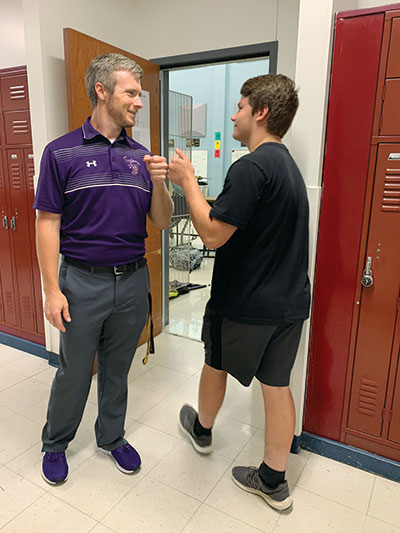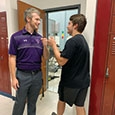“For the formation of the artist, the first prerequisite should be the development of the human being.”

Making Connections
To guide students into good life habits, we start by building strong relationships with them. There are numerous ways to make connections.
Connect music with life. If you are working on a piece of music that conveys a particular feeling, address that feeling directly. For example, if the piece is sad, define the sadness. Is it melancholy, mournful, distraught, longing, or heartbroken? If the piece is happy, is it jovial, excited, pleased, or joyful? Address these feelings and build from your or your students’ life experiences. Students will be able to relate specific feelings to instances from their lives. They will also see you as more human and relatable if you are willing to be vulnerable and share something that contributes to your feelings about the music.
Build good relationships. Focus on your students as people and show your students that you care about them as individuals, not as a random musician in your group. Greet them at the door as they enter your room. Talk to your students about things going on in their school lives or activities outside of school.
Attend other school events. Show an interest in your students away from your school obligations. My colleague attends at least one away football game and basketball game each season and takes his family to the spring play. Make a point to say hello to the coach, athletic director, principal, and your students. I go to the fall musical and always congratulate the cast following the show. I also try to visit the agriculture department, which runs several events throughout the school year. When students see you at events you are not required to attend, they will feel that you are more invested in them and the school beyond your class.
Find something unique about your students. I teach about 120 guitar students a year. One semester, I had two students who were frequent distractions and usually refused to work. I overheard them talking about playing Grand Theft Auto one day, so I spent five minutes of class talking to those two students about the video game while other students practiced individually. I was suddenly cooler to them because I had played Grand Theft Auto. They were much more willing to participate in class after that encounter because I showed an interest in their lives outside of class, even if it was just a video game. It might seem silly, but a brief discussion about a video game could be all it takes to connect to students who need you most.
When students realize that you care about them beyond your class, they will work harder for you, respond better to discipline, go out of their way to help you and the program, and start to model the same behavior and caring you do. As the great Fred Rogers said, “It is through human relationships that a child first learns love, compassion, generosity, and creativity.” Make every effort to pass on these characteristics to your students, regardless of what age you teach.
Teaching Life Lessons
It can be difficult to spot opportunities to address life skills through music education. Once you have made connections with your students and developed a level of trust, here are some ways to teach beyond the music.
Teach students to be good people. When the opportunity presents itself, take time during rehearsals to talk about the importance of making smart choices and the implications of one’s actions. For example, homecoming at our school includes junior/senior rivalry week. In recent years, there have been instances of the shenanigans escalating from harmless pranks to destruction of personal property. We stress the importance of having fun versus making decisions that can follow them for the rest their lives. Also, share good news with your students. Any time we receive a message congratulating the band on a great performance or exemplary behavior, we pass the message to students and discuss how proud we are to receive those types of comments. In our view, those messages are more meaningful than any trophy or performance placement.
Relate each day to real life. Look for chances to make experiences in your class meaningful beyond the classroom. Following a grueling rehearsal, remind students that some of the best or most rewarding things in life follow hard work. It might not be fun in the moment, but the result makes all the work worth the effort. This seems like a small concept to address, but students need that reminder. There will be days that you need that reminder, as well.
Additionally, do the same with discipline problems. If a student is frequently tardy, discuss with that student (and perhaps the entire class) the implications of regularly showing up late to a job, or have a private conversation with that student to learn the reasons for the tardiness. This might be an opportunity to teach the importance of communication or asking for help when times are difficult.
Adopt a motto. A former colleague and good friend of mine started using the hashtag #D2E, which stands for “Dedicated to Excellence,” when we worked together. He uses it on every post on his band Twitter page and has it posted all over the band room. This slogan reminds students to strive for excellence in everything they do, and that when they strive for excellence, great things will happen. This can be applied to many aspects of life in addition to musical performance.
Be flexible. Like most music programs, we share numerous students with sports, clubs, and activities, and there are frequent conflicts, with which we are incredibly flexible. If you are flexible and other teachers or coaches are not, students will recognize that and ultimately choose you. Be reasonable. Be respectful. If a coach or another activity sponsor is unwilling to work with you or a student, it is a reflection on their character, not yours or the student’s. Arguing and fighting only places the student in a difficult situation. It is better to demonstrate how you want your students to act as adults. We have had a number of students who did not return to sports the next season, choosing to stay in band because of situations like this. Be the person who makes them want to choose you.
Emphasize growth over results. During marching band season, a teacher in our building remarked to my colleague, “You’ve really got those kids fooled. They tried to tell me you don’t care what place they finish in.” It is true, and we emphasize that to our students. It is great to win and bring home trophies, but that should not be the goal. If you focus on growth and improvement, you will see good results.
When students are disappointed or discouraged after auditions or performances that do not yield the results they were hoping for, we ask them the following questions: “Did you practice and prepare? Are you better at your instrument as a result?” They usually say yes to both. If so, then it was successful and was worth doing. Those students are better prepared for the future and are better now than when they started. That should be the goal, but it is often difficult for young adults to accept. We have to encourage them that growth and experience is important and that failure happens. Failure (or perceived failures) should be a stepping stone to the next success.
Focus on the students. When someone compliments me about the band, I almost always respond with “They did a great job” or “They’ve been working really hard.” Students and parents will recognize this and appreciate you more because of this view. Also, I often tell students, “This is not my band.” I am only a small portion of the group. It is my hope that they realize that I am there to guide and help them, but that they also have to put in equal effort.
Failures Will Happen
If you are a college student or young teacher, you will make mistakes. Learn from those failures to better serve your students. I still have moments I view as failures, and I am still working to be better each day.
I recently had an easygoing guitar student. Occasionally, I had to ask him to put his phone away, but he was always quiet and respectful as he complied. One day, when I asked him to put his phone away, he responded, “No.” Surprised, I asked again, and the response was “No. I’m busy.” The situation escalated until I sent him to the office. After talking with the principal, I found out that his mother just got out of jail and was texting him. He was flustered and was trying to deal with the situation. You never know what is going on in the lives of your students. There is often a reason – likely unrelated to school or your class – for discipline problems. I wish I had pulled that guitar student into my office and chatted with him instead of sending him out of the room. The situation could have been resolved calmly, and I could have provided the support that he needed at that difficult time.
Some students have to worry about day-to-day necessities. Music might not be the most significant thing going on in their lives, but it might provide the most meaningful experience they have on a given day. I have had students who came to school because they knew they were going to have band or guitar that day. Be the teacher who makes kids excited to come to school every day, or at least provide them with a safe place to be a kid. Provide them with an experience that brings them joy, and reach out to those struggling students who need you most.
Closing Thoughts
We are music teachers, but part of our job is to connect with students and inspire them in all aspects of their lives. Set high expectations for your students and push them to achieve at those levels, but do it in a way that promotes caring, kindness, and respect. Your students will learn from your actions because, as John C. Maxwell stated in Everyone Communicates, Few Connect, “The mediocre teacher tells. The good teacher explains. The great teacher demonstrates.” Be the great teacher that models the uplifting behaviors and interactions you want students to take into this world as they grow older. By connecting character education with our music education, I truly believe we can make the world a better place.
Suggested Resources
Brené Brown’s short video about empathy versus sympathy: youtube.com/watch?v=1Evwgu369Jw
The Richest Man in Town by V.J. Smith (Simple Truths)
You Are Special by Fred Rogers (Penguin Books)






